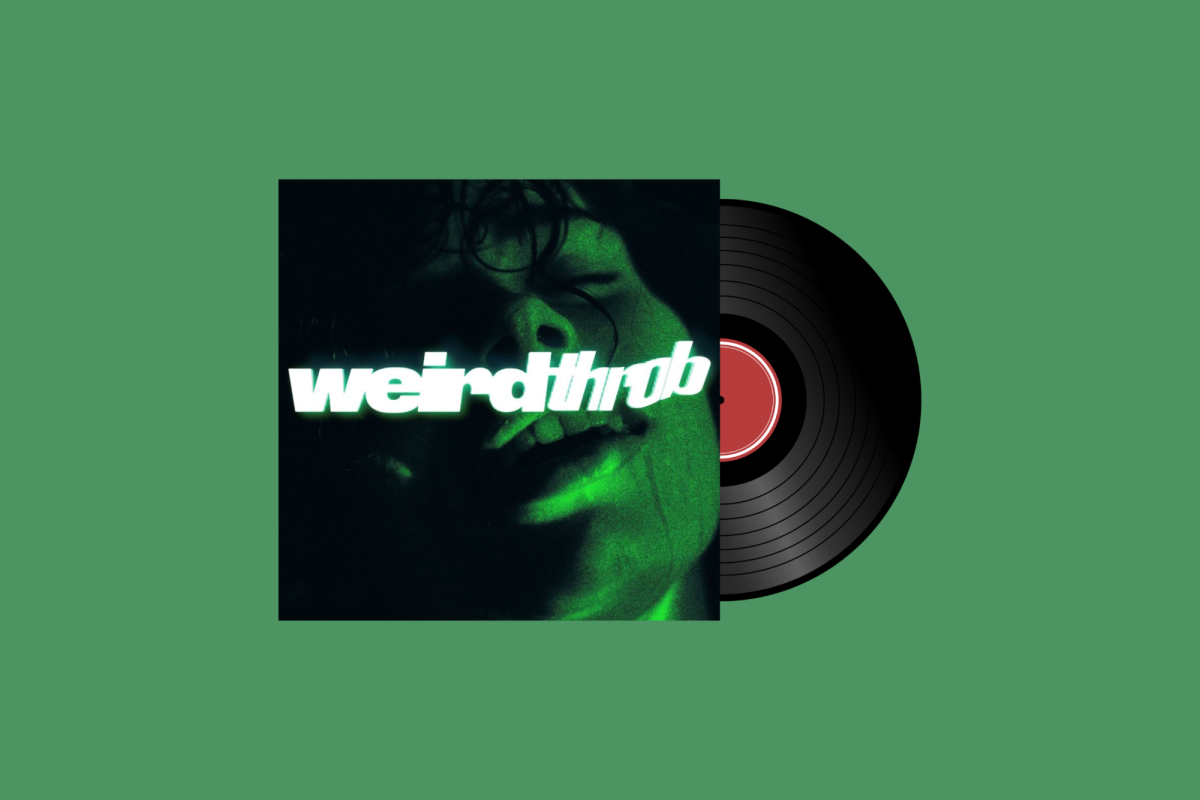In spite of its gritty metaphors and its persistent angst, mehro’s new album feels like a love story. The LA-based indie artist’s songs have always been punctuated by sophisticated yet conversational lyrics, somewhere between taking in a monologue and listening from the other end of a phone call.
Their fourth project “weirdthrob,” released Sept. 9, continues in this tradition. It depicts the ebbs and flows of a romantic relationship, but mostly the ebbs, set to the artist’s hazy, meticulous sound. Their newest work is a little shoegaze and a bit stripped back at times, melodies that they tackle with a voice like Elliott Smith’s. But in its most intense moments, “weirdthrob” also feels like an electrification of the artist’s previous craft.
The record’s sense of energy shifts throughout the album. Opener “Lifesaver” tells a tale of codependence, looking to a lover for reassurance in a moment when you feel like you’re drowning. Beginning with a subdued acoustic strum, the melody grows more intense, just as mehro’s voice grows more gritty during the song’s chorus: “I don’t believe it now / I don’t believe in then / People I love let me down / Maybe I let them.” The intensity is a first look for listeners at what “weirdthrob” offers sonically: equal parts tenderness and frustration.
In tandem with this sound, mehro’s depiction of romance in “weirdthrob” reveals a dysfunctional love that is reciprocated but not fully expressed. “Autoerotica” places emphasis on the self, set to a lively acoustic strum. “My soul was trapped inside this burning room / And all I could see / Was lust and love personified as you.” Amid the ongoing sense of emotional turmoil, mehro sings with a longing for security and clarity through someone dear, which serves as the record’s thematic backbone.
Themes of idealization and personal inadequacy run through the album. Mehro illustrates the allure of a lover in the rock-adjacent “You’re So Pretty,” where their mellow acknowledgement of attraction is juxtaposed with the song’s volume and stress, as if their feelings are undeserved. Longing clashes with self-loathing again in “Sex Fiend,” where mehro articulates the ways that anguish and a desire for escapism inform their relationship: “I want it to burn / I want it to hurt / I want it to hurry…”
Beyond the album’s clever guitarwork, what makes mehro’s music stand out is their clever use of metaphor: The titular analogy of “Sewers” sees the artist compare their mind to a filthy city underbelly, where they wallow and often end up tracing steps down their lover’s figurative street from below. Despite lurking just underneath the surface, “The distance livin’ between us / Is torture,” they lament. Likewise, mehro’s off-beat prose is highlighted in “Plastic Tires,” where they describe their love as “more than want and worse than desire / Like driving a ‘Rari with plastic tires.” These comparisons are often outlandish, yet feel grounded in earnestness and depth.
Conversely, its moments of intense cynicism are the most memorable. “Lady Parts and Mannequins” becomes a highlight on the album through its frenetic riffs and precise drumwork. It sees mehro at their most disembodied, addressing a relationship solely in terms of physical desire and lust. They claim it can be nothing more, and “Where it starts is where it ends.”
In the end, the album pivots back towards sincerity. The final song “Sepia Tones” sees mehro break from their personal spiral, turning to a place of reflection: “I find in my life / That I’m looking for somеthing to break,” they confess. The juxtaposition, on this song and “You’re So Pretty,” between mellow strumming and mehro’s harsh vocals conveys both thoughtfulness and frustration, an acknowledgement that mental turmoil colors every aspect of their relationship.
Listeners won’t know any specifics about mehro’s lover by the end of the album, but they depart the world of “weirdthrob” understanding the ruminations and darker emotions that falling for them evoked. Mehro’s memorable acoustic sound doesn’t just evolve on “weirdthrob,” it amplifies itself in volume and spirit. When paired with prose-like lyricism and honest introspection, the album earnestly confesses the beautiful horror story of falling in and out of love.
Contact Eleanor Jacobs at [email protected].























































































































































